#the looks of the Maharshi
Explore tagged Tumblr posts
Text
The mind is by nature restless. Begin liberating it from its restlessness; give it peace; make it free from distractions; train it to look inward; make this a habit.
-Ramana Maharshi
91 notes
·
View notes
Text
some of my favorite quotes about non dualism !
"I am real for I am always now, in the present, and what is with me now shares in my reality. The past is in memory, the future in imagination."
- Nisargadatta, I Am That, Chapter 3
"All these years you've been searching & looking, & trying to change things, trying to add things onto yourself, trying to acquire things when you have been the source of everything to begin with. Everything you've been looking for has been within yourself, you have been that. Begin to surrender everything to yourself. You surrender all of your thoughts, all of your feelings, you surrender all of your desires, all of your wants to the Self. You pull it in all inwardly."
- Robert Adams
"It is the nature of the mind to wander. You are not the mind."
- Ramana Maharshi
"Anything that you respond to is a product of your mind. It is your mind that becomes angry. It is your mind that becomes stubborn. It is your mind that wants to get even. It is your mind that is hurt. But if you subdue your mind, tell me, where is the anger?"
- Robert Adams
"Free yourself from the illusion of good and bad days. Labeling time makes us nostalgic of the past and demanding of the future. There is only here and now. Let it be."
- Ram Dass

135 notes
·
View notes
Text
Why do people teach this?
First of all I’m not a teacher or anything like that, I’m simply someone who wishes to share her experience
Now there was something Sri sarvapriyananda said
It’s a story so I’ll say it.
There was a town behind a wall, the town was drowning in poverty, there was no color in the world , everyone was so sad and were all round just suffering , and that was all they ever knew ; they didn’t know anything like joy existed.
One day three men decided to look over the wall, and they found a beautiful paradise, green, healthy , happy. It was basically heaven on earth . They were so happy to have found it
The three of them made one choice each
One decided to climb over the wall and live in that paradise.
One decided to go tell others of this beautiful paradise so that they too may find joy
While the last one decided to keep living in the old town but from a completely different point of view. The world he thought he knew was not so limited anymore and he found peace in that and that was enough for him.
All of us are just like those three men trying to look over the wall and see (the true nature of our being )
This seeming plot line doesn’t cease when you awaken , no it’s still very much here
Many awakened people can decide to live knowing they’re not a person but however still continue to live in this seemingly wicked world
Some may decide to spread the news (like Ruper spira, Sri sarvapriyananda, Ramana Maharshi, being is it, @ko-existing @i-amyou @clochettesworld etc and all the people we seemingly learn from)
While some can decide to live in paradise
It doesn’t matter as long as Self has been revealed then , Nothing can be wrong
Why? Cause what determines wrong and right? Self is all that is and whatever seemingly appears is an energetic expression of this radiance.
Rupert spira has mentioned a few times that once you take these pointers and focus on the light of awareness, when Self shines through, you can go back to experiencing the world but now the way you seemingly experience it will change.
First of all you would regard everything as an appearance and the intensity with which life held you, will no longer be there .
A particular anon has been spamming my inbox insulting me and saying I copy being is it and koda . Haha I learnt from both of them so if there are similarities they are not intentional. You were curious about a lot of things and I hoped to have answer them here , also if you really are so intelligent (as you said one time) why bother sending things like that hm? If you know it’s all not real why do you send such hate for seeming people that are all one with you ? Don’t you regard your seeming intellectual dominance as another farce created by the mind?
Anyways if you keep sending asks, i could keep reading them if that will please you so but I won’t acknowledge you anymore
For everyone else , Notice
62 notes
·
View notes
Text
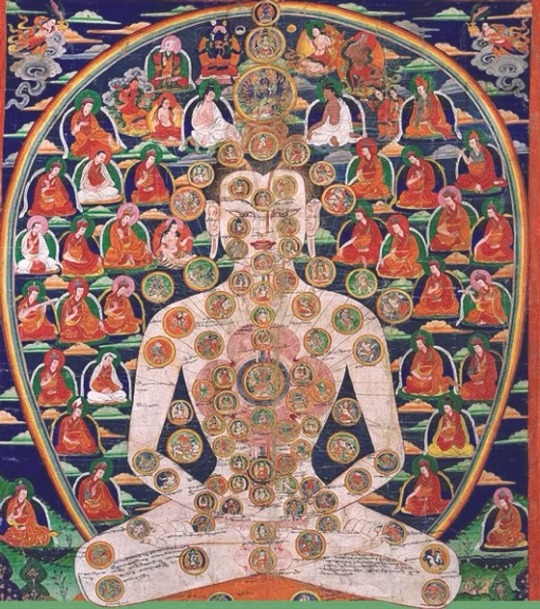
SILENCE
"Trust yourself. At the root, at the core, there is pure sanity, pure openness. Don’t trust what you have been taught, what you think, what you believe, what you hope. Deeper than that, trust the silence of your being." ~Gangaji
“Silence is sometimes the best answer” ~Dalai Lama
“Emptiness is emptiness. San Francisco or Delhi. Wherever you go, the emptiness surrounds you. Silence will follow you wherever you go.” ~Papaji
In the sweet territory of silence, we touch the mystery. It's the place of reflection and contemplation, and it's the place where we can connect with the deep knowing, to the deep wisdom way. ~Angeles Arrien
Don't look for meaning in the words. Listen to the silences. ~Samuel Beckett
Nothing is so like God as silence. ~Meister Eckhart
Silence is God's first language; everything else is a poor translation. In order to hear that language, we must learn to be still and to rest in God. ~Thomas Keating
There is no need to go to India or anywhere else to find peace. You will find that deep place of silence right in your room, your garden, or even your bathtub. ~Elisabeth Kubler-Ross
Silence is the shaft we descend to the depths of contemplation. Silence is the vehicle that takes us to the innermost center of our being which is the place for all authentic practice. ~Elaine MacInnes
It is in deep solitude and silence that I find the gentleness with which I can truly love my brother and sister. ~Thomas Merton
The silence is there within us. What we have to do is to enter into it, to become silent, to become the silence. The purpose of meditation and the challenge of meditation is to allow ourselves to become silent enough to allow this interior silence to emerge. Silence is the language of the spirit. ~John Mains
Silence of the heart is necessary so you can hear God everywhere — in the closing of the door, in the person who needs you, in the birds that sing, in the flowers, in the animals. ~Mother Teresa
Let me rest in Your will and be silent. Then the light of Your joy will warm my life. Its fire will burn in my heart and shine for Your glory. This is what I live for. Amen, amen. ~Thomas Merton
The seeker's silence is the loudest form of prayer. ~Swami Vivekananda
Still music
Quiet sound
Deepwater
Silent ground ~Zen Saying
The friend of silence comes close to God. In secret, he converses with him and receives his light. ~John Climacus
The thing is to kill the mind, somehow. Those who have not the strength to follow the inquiry method are advised Pranayama as a help to control the mind. And Pranayama is of two kinds: one of controlling and regulating the breath and the other of simply watching the breath. ~ Ramana Maharshi
26 notes
·
View notes
Text
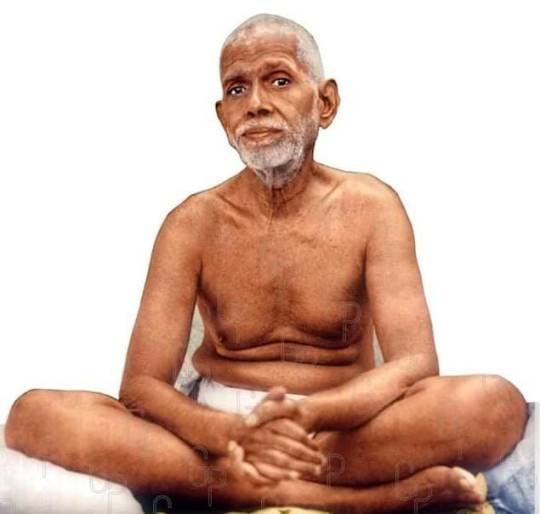
M: “No powers can equal Self-realization.
People are not content with their idea of jnana and want siddhis as well. They only look at the body. They are likely to neglect the supreme happiness of jnana and get side-tracked and lost on the way instead of following the royal path. Jnana is everything, and a jnani will not waste any thought on the occult powers."
The Maharshi is unvarying in his attitude towards psychic visions. Even when his disciples report that his own picture has appeared to them, transfigured in brilliant light, he counsels them to put aside all form and to remember that what is thus seen is perish¬able; what has an origin must have an end; it is the intuitive per¬ception of the Self that must be seized.
M: "The seer, the seen and the seeing was all one, all within yourself. Nobody else saw it. It was your own fancy, and yet it is also true that YOU really did see it."
- Conscious Immortality
22 notes
·
View notes
Text
All fear is nothing but thoughts. If there is only One, there cannot be a second to fear. If we look at our Self as one, there is nothing else to fear. Ramana Maharshi
15 notes
·
View notes
Text
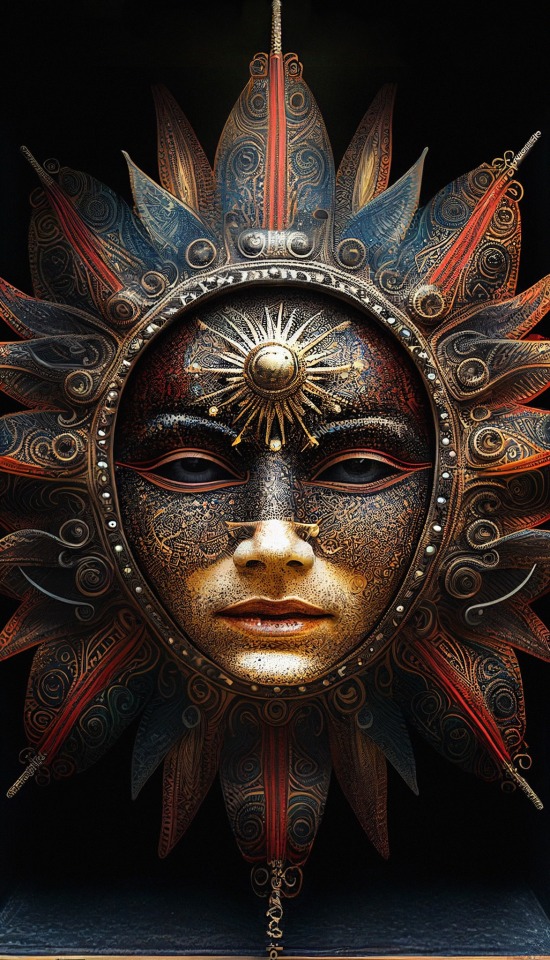
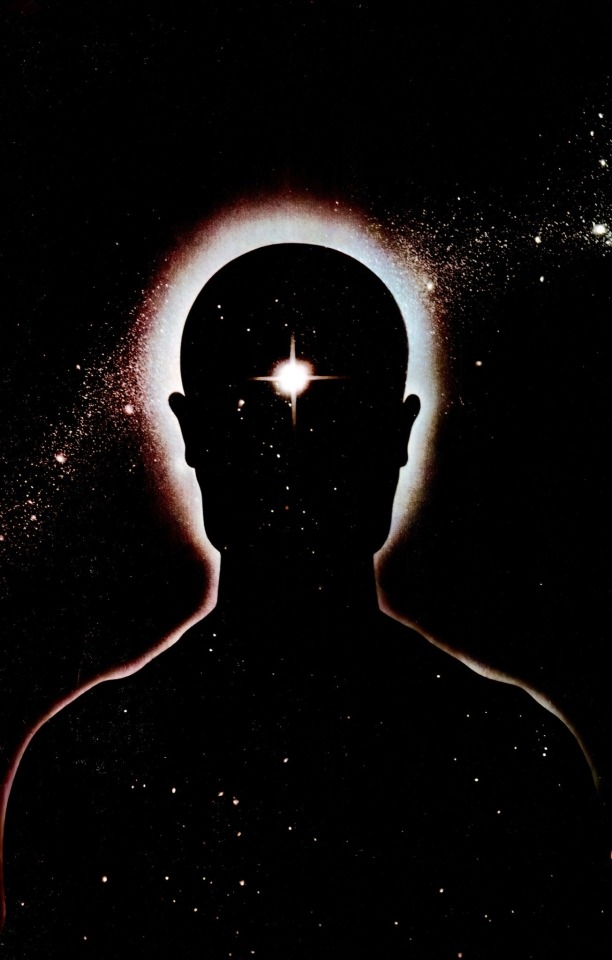
“This perception of division between the seer and the object that is seen, is situated in the mind. For those remaining in the heart, the seer becomes one with the sight.” — Ramana Maharshi
Sirian Seer Talon Abraxas Ajna Chakra – The Third Eye Chakra
Ajna Chaka, the sixth Chakra, is known as the third eye. It is located at the forehead, and represents the visual, intuitive, psychic center of perception. It is here where our memories are stored, imagination develops, and where we perceive dreams.
The definition of Ajna is “to perceive.” It can also mean “to command.” Our memories and perceptions influence and shape the events that take place in our lives just as words shape the world. We command our visions to come into reality without realizing.
Element: Light
The element that represents Ajna Chakra is light. As you know, light is the most versatile element known to man, and has a higher and faster vibration than sound. Light travels at an unfathomable speed and distance. It continues across the universe for thousands of years, allowing us to see stars as they were long ago. When we look around us and see objects, it is in fact the reflection of light that helps us to see. Without light, we could see nothing at all.
Color: Indigo
All of the chakra points are associated with a specific color. The color associations have changes since the ancient Tantrics’ time, however. Now, the colors are based on the rainbow spectrum, beginning with red light, which is associated with the base chakra, and ending with violet, which is associated with the crown chakra. The order follows the rainbow pattern from the base to the crown: red, orange, yellow, green, blue, indigo, violet.
Attributes: Clairvoyance, memory, dreams, vision
The Ajna chakra is related to a rudimentary organ that is sensitive to light, called the pineal gland. The pineal gland, in the embryo, begins to develop in the precise center of the head as a third eye. Though this gland atrophies, it has been found that this area of the head remains sensitive to light. Some believe that the pineal gland in full-grown adults plays a role in mental visions that sometimes occur when individuals are in a deep state of meditation. The sixth chakra, our intuitive level, allows us to gather information from internal visions and images.
Ajna chakra, when it is fully open and functioning, can enhance our awareness of the images within our minds so that we can consciously use this mental energy to provide us with an alternative means for gathering information. Interpreting dreams is the simplest example, however the most developed example of the potential of a functioning Ajna chakra is clairvoyant sight, or psychic ability. Individuals who are open are aware of their perceptions and are able to interpret them in a practical way. Nightmares, headaches, and vision trouble are sometimes the result of a closed third eye. Hallucinations and confusion result from over-interpreting regular events and having this chakra open too widely without reasonable foundations.
All people have and use their third eye, intuition or psychic ability, to a certain extent without knowing it. Though our daily intuitive perceptions may be subtle, they are quite valid and should be treated as such.
Using our ability to recognize patterns and to create an internal visual language that we can use to interpret those patterns can help us to open our psychic perception. For example, if you have seen someone do something in the past, it is likely that they will do it again. Our perception of the divine order is enhanced as we move upward through the chakra levels. This allows us complete the missing pieces in our perceptions, which may actually exist in a different space and time.
Visual media, television and movies, advertisements and other things can clutter our chakra. In order to clear the vision of our third eye, we must separate ourselves from all of these images that are fed to us, and see the world without preconceived vision, as a child experiences things for the first time. Once we accomplish this, were can experience an amazing psychic vision that clearly sees beyond the physical realm.
If you would like to open your Ajna chakra, and enhance your ability to see from your third eye, try an exercise. You may begin with the base chakra and work your way up or start with the crown and move downwards. Focus on one chakra at a time and fill that area of your body with the associated color energy. Do this slowly so that you can experience the balancing of each chakra.
24 notes
·
View notes
Text
WHEN THERE IS NO DUALITY, WHO IS TO REMEMBER WHOM? WHO IS TO SEE WHOM? ~
Devotee: Bhagavan, I have read much of the Vedas and the sastras but no Atma jnana [Self-knowledge] has come to me. Why is this?
Maharshi: Atma inana will come to you only if it is there in the sastras [scriptures,. It you see the sastras, sastra jnana [knowledge of the scriptures] will come. If you see the Self, Self-knowledge will shine.
Devotee: How to see the Self?
Maharshi: Everyone says 'I am'. How do we know that this is true? Do we know this by looking in the mirror or do we know it only after looking in the sastras? Tell me.
If the Self is something to be seen, there should be two selves [the self which looks and the Self which is seen].
Would you agree that you have two 'I's?
Devotee: No.
Maharshi: The reality that exists is only one. Then how can there be another self which is to be seen? All are seeing the Self everywhere but they don't understand.
What a pity! What to do?
If the thought 'I am this body' is given up, what is seen is only the Self.
Devotee: What am I to do? What is my duty?
Maharshi: Now you have nothing to do. Enquire 'Who am I?' Then, when you have found out who you are if there is still duty, it maybe done.
Ramana Maharishi
11 notes
·
View notes
Text
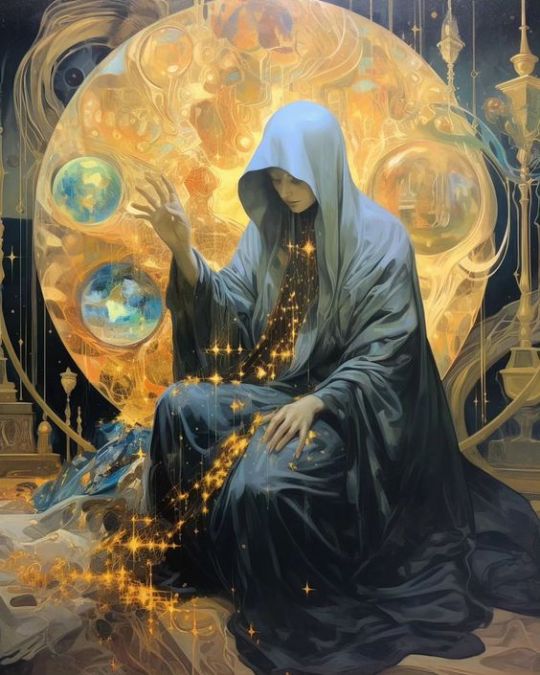
“C’è solo una cosa da fare. Guarda dentro di te” Sri Ramana Maharshi ************************ “There's only one thing to do. Look inside yourself" Sri Ramana Maharshi
17 notes
·
View notes
Note
Can I ask, have you realized your Self? And if yes, could you say a little bit of how it was/is like for you? This is something I don’t see people talking about much… they usually just say “it can’t be described” or something similar... I hope that if I can understand a little bit better what it is actually like, I won’t be so scared to let go. Thank you.
I talked about it here. I have realized my Self but I wouldn't say I am a fully realized "master" like Lester, Robert, Ramana Maharshi were yet. Ego still comes up but with the understanding it is not me, it is easier to drop or disregard it completely and just do whatever I want.
It's possible to see all the way, see the Oneness, by momentarily submerging the mind. But as long as that mind is not undone, it will re-emerge. But you'll never let go once you drop into that state of Oneness. You'll go into it again and again until it becomes permanent. What is required is that we re-establish that state of the Self again and again until it becomes permanent. Each time we do it, we scorch more of the mind, until finally we have scorched the entire mind. Then we are permanently established in the Self. Then you sit back and the mind is out there and the body is out there and you are not the mind, you are not the body. As long as you know you are not the mind and the body, both of them can go on to their heart's content, and you know that they cannot touch you. from Sessions 3 and 16 of Keys to the Ultimate Freedom by Lester Levenson
I'm not really sure what you're looking for exactly? What are you afraid of? You don't lose anything, just the bondage and limitations. Something I am feeling and understanding a lot these days is described in this post by 4dbarbie. It's SO freeing, there is nothing to be afraid of. Rather, I think the thing to be more afraid of is to remain stuck in your ways and continue to live in this mundane worldly egoic life. Why live this way when you can be free? Why is freedom scary? Ask yourself those questions and drop whatever comes up. This is honestly the best thing one could ever do or "accomplish" in one's life. You won't stop existing (actually you can't, your true nature is eternal, changeless, timeless, formless). You'll just know who you truly are. It's coming back home to yourself.. in the most beautiful and truest way possible.
I woke up feeling absolute freedom. I never realized I had felt so trapped before. Now I feel so giddy it's ridiculous. And realizing that I can feel like this... all the time... because I choose to... it's absolutely fantastic. You can think and feel whatever you want, I swear, you can only pay like 2 seconds worth of attention to unwanted circumstances, and just continue feeling good about yourself, for yourself, inside yourself. You really, *really* can pay less attention to things you don't like than you think.
Just imagine it, the confidence. Being completely unfazed by circumstances because you know it starts and ends in you. It's one thing to know it in theory and another to really feel yourself to be the arbiter of your own fate...
15 notes
·
View notes
Text
The mind is by nature restless. Begin liberating it from its restlessness; give it peace; make it free from distractions; train it to look inward; make this a habit. This is done by ignoring the external world and removing the obstacles to peace of mind.
-Ramana Maharshi
31 notes
·
View notes
Text
"Ramana Maharshi's Forty Verses on What Is"
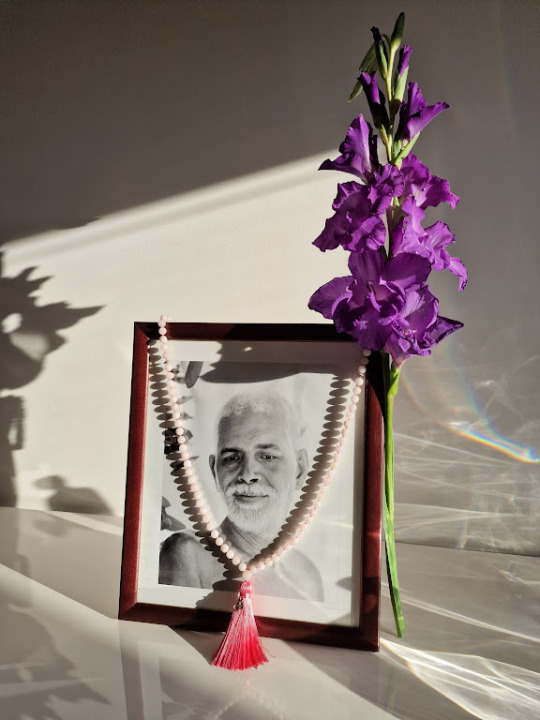
🕉️ 🔱 Om Namo Bhagavate Sri Arunachala Ramanaya 🔱 🕉️
🕉
From the Book: Ramana Maharshi’s Forty Verses on What Is - A compilation of the writings and talks on Uḷḷadu Nāṟpadu - By Michael James (published by Sandra Derksen)
Extract from: Editor’s note
🕉
Michael’s explanation about not capitalising ‘s’ in ‘self’
There is one point I would like to mention and on which I had to ask Michael’s advice. I noticed that he did not capitalise the ‘s’ in ‘self’ or ‘self-investigation’, among other terms, something I was used to doing myself and encountered when reading texts by others who write and talk about ‘the Self’. I want to share his detailed explanation with you, because it provides an important clarification that can deepen your understanding of Bhagavan’s teachings and who you actually are; to my knowledge, he is unique in this usage.
Michael avoids the term ‘the Self’ as it is usually written in English books. One reason is that there is no such term in either Sanskrit or Tamil, because they contain no definitive articles (‘the’) and, secondly, there are no capital letters.
Another reason is when we talk of ‘the Self’ we are reifying it. We make it sound like ‘the Self’ is something, but obviously there is no such thing as ‘the Self’ other than the thing whose self it is. Everything is itself. The lamp post is itself, the road is itself, the water in the lake is itself, you are yourself, I am myself. From where can we extract some separate thing called ‘the Self’? If we talk about something, ‘the Self’, then it seems to imply something other than ourself. So, we do not naturally talk about ‘the Self’: ‘the Self’ is now going for a walk, ‘the Self’ is now leaving a message. We do not talk like that, we say ‘I’: I myself am doing it. So, using the word ‘Self’ as a noun with a definitive article, ‘the’, reifies it.
‘Self’ is better understood as a pronoun because the word ‘self’ refers to something. Whose self is it? You are yourself, I am myself. So, if you use ‘self’ it can have a meaning only in a particular context, like any pronoun. If you say ‘he’, ‘she’ or ‘it’, that has to refer to something, and if it is not clear from the context what it is referring to, it is meaningless. If you have got a group of fifty people and you say, ‘He and she are the ones I am looking for’, which he and she? There are so many he’s and she’s. So we can use pronouns only in context where it is clear what the pronoun is referring to. Pronouns do not have a fixed reference, their reference is determined by the context.
The only pronoun that could arguably have a fixed reference is ‘I’, because when we each use the term ‘I’, we are always referring to ourself. But if you say ‘I’ you are referring to someone different than when I say ‘I’. That is, when we use the word ‘I’ in the usual sense, in the superficial sense that we usually use it, for me ‘I’ refers to Sandra, for Michael ‘I’ refers to himself. That is, of course, not the real meaning of ‘I’, but that is the sense in which we usually use the word ‘I’. So ‘self’ is like that, ‘self’ is regarded as a pronoun, which is why Michael generally translates the Sanskrit term ātman, and the equivalent term in Tamil, namely taṉ, as ‘oneself’ or ‘ourself’. That is a more natural way of expressing it in English.
Also, when we use capital letters, when we talk about ‘the Self’ with a capital ‘S’ and another ‘self’ with a small ‘s’, there is implied duality there, as if there are two selves. Something that Bhagavan repeatedly said is that there are not two selves, there is only one self. What we actually are is the pure awareness ‘I am’ without any adjuncts. But now we experience ourself mixed and conflated with adjuncts, as ‘I am Michael’, ‘I am Sandra’, ‘I am whoever’. That is the same ‘I am’, but the ‘I am’ in pure condition is our real nature, the ‘I am’ mixed and conflated is ego. So it is not that there are two selves, it is ourself as we actually are and ourself as ego, just like the rope and the snake are not two different things. There is only one thing there. What is actually there is just a rope. But the difference between the snake and the rope is not a difference in substance, it is a difference in appearance. So in some places it may be useful to make a distinction between ego and our real nature.
Often when we use the word ‘self’, or when Bhagavan uses the word ‘self’, it is not specifically referring to ego or to our real nature. For example, in the word ātma-vicāra, is the ātma in ātma-vicāra ego or is it our real nature? Well, it is not necessary to say, because we begin by investigating what seems to be ego and we discover it to be our real nature. That is, if you look carefully at the snake, you see it is a rope. If you look carefully at ego, you see it is pure awareness. It ceases as ego and it remains as pure awareness. That is, it ceases to appear as ego. So ātma-vicāra is usually translated as ‘self-enquiry’. Michael thinks a more useful and accurate translation is ‘self-investigation’. But whether you use ‘self-enquiry’ or ‘self-investigation’ most people will put a capital ‘S’ for that. But why put a capital ‘S’ there? We are not investigating some big self that we do not know, we are investigating the very self that we are. So by introducing capitals that you sometimes use and sometimes do not use, you are limiting the meaning, because when you put a small ‘s’ it means ego, if you put a big ‘S’ it means our real nature. It just creates an unnecessary dichotomy, an unnecessary and false duality, that does not actually exist. Sometimes ātma means ego, for example, in the term ātma-samarpaṇa, which means self-surrender. What is the self that needs to be surrendered? Obviously that is not our real nature, it is ego. So that is another reason why Michael prefers not to use capitals.
Then people sometimes use capitals, for example, for ‘consciousness’ or ‘awareness’. Sometimes they put a capital and sometimes they do not. But again, you make it sound like there are two ‘consciousnesses’, two ‘awarenesses’. That is just creating a confusion. Bhagavan did distinguish between pure consciousness and the adjunct-mixed consciousness that we call ‘ego’. But that does not mean that there are two ‘consciousnesses’. It is one consciousness: one in its pure condition and one and the same consciousness mixed and conflated with adjuncts, which is called cidābhāsa, the semblance of awareness. So as soon as you start using capitals you have to decide in each case whether you are referring to what is real or to what is unreal — whether you are referring to the reality, or whether you are referring to the appearance. If it is the reality, you have to put a capital ‘S’, if it the appearance you have to put a small ‘s’. But what if you do not want to specify if you are talking about the reality or the appearance, you are just talking about the thing in general? So it creates an unnecessary confusion that is not there.
All duality is false. That is, thinking in terms of two selves, a big ‘Self’ and a small ‘self’, is not helpful, because it is missing the whole point of Bhagavan’s teachings. Michael affirms this is an important point. It is not just a matter of literary style, it is a matter of conveying what Bhagavan is saying in the clearest and most accurate way that is true to how he expressed himself.
🕉
A free book sample is available (includes ‘Introduction by Michael James’) on:
https://u.pcloud.link/publink/show?code=XZol6NVZvajJMSyzNgz6hM4lY75mkzrbjgY7&fbclid=IwAR020rUa3su0MIDiVU4hO2XpkhIhBsBK0bmt_XY33csWqNSbrqTecwtphFw
🕉
#bhagavan sri ramana maharshi#michael james#sandra derksen#vichara#atma-vichara#self-enquiry#self-investigation#ulladu narpadu#forty verses on what is
12 notes
·
View notes
Text
"I cannot show you God or enable you to see God because God is not an object that can be seen. God is the subject. He is the seer. Don't concern yourself with objects of senses. Find out who the seer is. You can't see God because you are God."

~ Ramana Maharshi
“The eye through which I see God is the same eye through which God sees me; my eye and God's eye are one eye, one seeing, one knowing, one love.”
~ Meister Eckhart
"You are looking for God. That is the problem. The God in you is the one who is looking."
~ Rumi
“By knowing yourself, you know God. By knowing God, you know yourself.”
~ Anandamayi Ma
“When you experience the true meaning of religion, which is to know God, you will realize that He is your Self, and that He exists equally and impartially in all beings. Divisions are imaginary lines drawn by small minds.
Forget your dream-born mortal weakness. Wake up and know that you and God are one.”
~ Paramahansa Yogananda
“Why is it so difficult to find God? Because you’re looking for something you’ve never lost.
The finding of God is the coming to one’s own self.”
~ Meher Baba
“Has it ever occurred to you that you are seeking God with His eyes?
The truth is that you already are what you are seeking. You cannot find it because you are it. You can’t look at what’s looking. You can’t think about that which is prior to thought. The mind cannot comprehend what is beyond the mind.”
~ Adyashanti
"We go off in search of ourselves or God or the Atman or whatever, but it's the one thing we can't find – because we're already it.
Jesus Christ knew he was God. So wake up and find out eventually who you really are. In our culture, of course, they’ll say you’re crazy and you’re blasphemous, and they’ll either put you in jail or in a nut house (which is pretty much the same thing). However, if you wake up in India and tell your friends and relations, ‘My goodness, I’ve just discovered that I’m God!’, they’ll laugh and say, 'Oh, congratulations, at last you found out.'
The point is that God is what nobody admits to being, and everybody really is.”
~ Alan Watts
“You can't see God because you are God! How can you search for that which you are?
No one is a 'part' of anything. My role is to apprise you of the fact that you are not a part, that you are the whole.”
~ Papaji
“All religions are the same. They all lead to God. God is everybody.
See God in everyone. It is deception to teach by individual differences.
The best form in which to worship God is every form.
Everywhere I look I see only God, and that's why I'm always honoring everything.”
~ Neem Karoli Baba
"To imagine oneself a separate self is the ultimate blasphemy. It is normally considered that to say 'I am God' is blasphemous. However, what is truly blasphemous is to say 'I am a separate self'. With this thought, consciousness denies its own unlimited universal sovereignty. It relinquishes its freedom. It is not blasphemous to feel and say that I am the totality of experience. It is a position of love in which everything and everyone are included."
~ Rupert Spira
"The person is not God, the body is not God, but you are God. The reason you will not accept the fact that you are God is because of your orthodox upbringing. If I tell you you’re God, you think it’s blasphemy. That only shows me that you are identifying with your body. You believe you are a body, and there is a God somewhere up in the sky that you’ve got to pray to, and if he is in a good mood, he’ll give you a boon. If he’s not feeling too good that day, he will throw a lightning bolt at you. People still believe that. God is consciousness. And that is not outside of yourself. It is you. You are that.”
~ Robert Adams
“Even to say that God is close is not exactly right – because closeness, after all, shows a certain distance; closeness is distance. God is not close – God is you. You are God. So don't look for God in the churches, in the temples, in mosques. Look for him within. We have just to be a little calmer to feel him. The turmoil in the mind does not allow us to feel. And God is not a person – you cannot worship him; there is nobody to be worshipped. The worshipper is the worshipped. That's what Jesus means when he says again and again, ‘The kingdom of God is within you’. And the kingdom is such that it cannot be taken away from you. The whole existence is God. I want you to destroy duality completely. God is in the trees, in the rivers, in the moon, in the sun, and he is in you. Except God, there is nothing else.”
~ Osho
"God is not playing with you. God is playing as you.
I know you and love you far too much to treat you as a mere person. I refuse to know you as less than God."
~ Mooji
“Invite your attention towards yourself seriously and you will come to know that there is no God except yourself.
It is so simple... All you have to ‘do’ is realize that the body is not your identity. You are Ultimate Reality.”
~ Ramakant Maharaj
“Ultimately you are the proof that God exists, not the other way round. For, before any question about God can be put, you must be there to put it.
"I am" itself is God.
You yourself are God, the Supreme Reality.”
~ Nisargadatta Maharaj
“So long as God seems to be outside and far away, there is ignorance. But when God is realised within, that is true knowledge.
You should love everyone because God dwells in all beings.
All will surely realize God. All will be liberated. It may be that some get their meal in the morning, some at noon, and some in the evening; but none will go without food. All, without any exception, will certainly know their real Self.”
~ Ramakrishna
“The fool thinks, "I am the body"; the intelligent man thinks, "I am an individual soul united with the body." But the wise man, in the greatness of his knowledge and spiritual discrimination, sees the Self as the only reality and thinks, "I am Brahman."”
~ Shankara
"I and the Father are one."
~ Jesus
🙏❤️💖💟💛💚💙
11 notes
·
View notes
Text
Good morning. 🕊️🕊️🕊️
26 August 2024

Isn't it funny how we all think that we are center of the universe. We are in a way, don't you think? Our consciousness is alone in our bodies and sees everything from that viewpoint. At least for most of us it's that way, there are a few people who have company, or so I've read. Hmmm … I was going to say it must be nice never to be alone, or a curse, but then I looked down and there is Charlie, ever present. The difference with Charlie (my dog), is he thinks I am the center of the universe. Anyway, back to point, from our perspective as individuals, we each are at the center and everything else exists around us like spokes on a wheel … sort of.
"Consciousness is indeed always with us. Everyone knows 'I am!' No one can deny his own being." - Ramana Maharshi
#photo#photography#photographer#photographylovers#wildlife#nature#bird#birds#birding#birdwatching#birdphotography#morning#pigeons#consciousness#doves#birds of north america#birdsphotography#birdlovers#wildbirds#wildlife photography#wildlifephotograph#wild bird photography#bird watching#bird photography#birdingphotography#birds nature#backyard birds#rock pigeon#rock doves
2 notes
·
View notes
Text
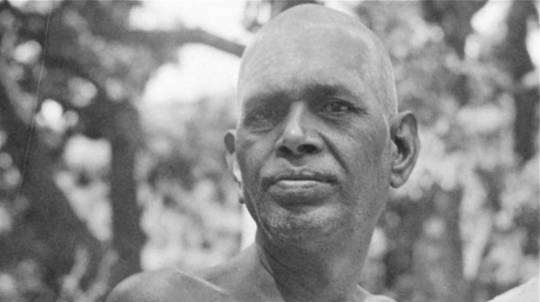
Morarji Desai, Prime Minister of India (March 1977 to July 1979), was President of Ramana Kendra, Delhi, 1968-70.
I had the privilege of seeing Ramana Maharshi in August 1935 in the hall in which he usually sat. He was sitting on a sofa and wore only a loincloth. I could see an aura on his face, which was glowing with peace and joy. I sat opposite to him but did not ask him anything. He too did not say anything to me. I sat just over an hour and just looked at his face. Till today I have not seen that aura, that joy or peace on anybody else’s face. That hour of perfect stillness in that silent presence has been a precious memory ever since.
While I sat there, no questions arose in my mind, nor did I feel any desire to ask anything. I was at complete peace with myself. It was this experience that convinced me that Ramana Maharshi had realized God or Truth. Some of his disciples who were present asked him some questions, which he answered. He, however, said nothing of his own accord.
I had to leave the place next day by train at about twelve. About an hour-and-a half before the time of departure, I approached Ramana Maharshi for permission to leave. He told me that I should go after I had eaten. We sat down for lunch along with the Maharshi, at about eleven O’clock. After lunch, I bowed down to him and left.
The visit left an abiding impression on me and convinced me that Ramana Maharshi was a realized soul and that the ideal of ‘action in inaction’ as propounded in the Gita is really attainable.
Presiding over the 99th Jayanti celebrations of Ramana Maharshi at Ramana Kendra, New Delhi, on 13th January 1979, Morarji Desai as Prime Minister, said:
The Maharshi seemed to know everything. He knew the language of the animals. He listened to their complaints. He treated every being in the same way, whether it was a cow or a dog, a crow or a monkey. All were equal in his eyes, the beggar and the millionaire. He never went out of Tiruvannamalai. He refused to go out and preach. He said, “If I am a jnani, I consider everybody else a jnani too. What is there to give?” He regarded everybody as himself. He made no attempt to convert anybody. One got transformed by his very presence.
Many civilizations have flourished and then disappeared. But in this country, you find our old culture and the ancient religion still alive. And it is this that keeps the country alive. It is persons like the Maharshi who keep it alive...All learning should come from within. That is the way the Maharshi showed. He did not criticize others way of life. He said, “Stick to your own religion and follow it properly.” Ramana Maharshi taught that one could do sadhana in one’s chosen way and reach the goal.
- Face to Face
11 notes
·
View notes
Text
You are all searching for the silence of the mountain. But you're looking for something outside. This silence is accessible to you right now, inside the center of your own being. - Ramana Maharshi
10 notes
·
View notes